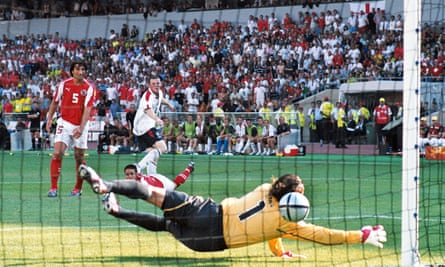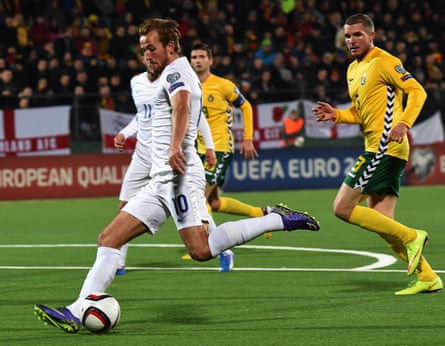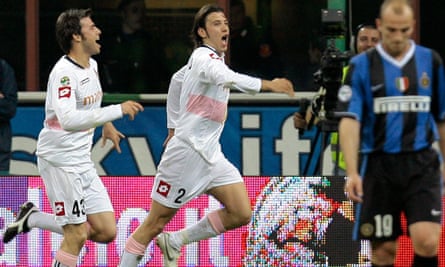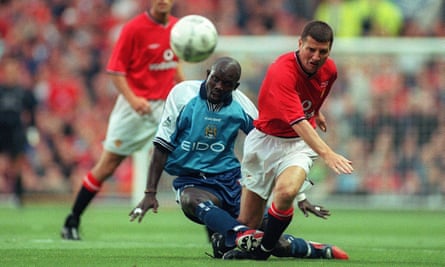Should Harry Kane already be England’s leading goalscorer?
Plus: World Cup-winning centre-back pairs at club level, testimonial misfortune and long waits for a draw
- Mail us your questions or tweet @TheKnowledge_GU

“Following Ally McCoist’s tongue-in-cheek claim that Kylian Mbappé scored ‘the first World Cup final hat-trick where all three crossed the line’, are there any other examples of footballing firsts or records whose holder is disputed or shrouded in controversy?” tweets Steve Hyde.
A footnote in England’s World Cup defeat to France was that Harry Kane’s second penalty would have been his 54th goal for England, putting him one ahead of Wayne Rooney on the all-time list. But there is an argument that he should already be out on his own as England’s leading goalscorer.
“Surely Coleen Rooney should be putting her considerable sleuthing skills to good use and examine whether her husband’s international scoring record should stand at 52 goals instead of 53?” writes Dylan Kenny. “His second goal v Switzerland in Euro 2004 is definitely an own goal.” Rooney’s second goal in that game came from a drive that hit the post before rebounding off the goalkeeper Jörg Stiel and into the net. A clear own-goal in 2023 but, as the dearly-missed Kevin McCarra wrote at the time, in 2004 there was a different attitude to such goals.

What makes things even more interesting – to us, anyway – is that Kane was involved in a very similar goal against Lithuania in 2015. But by then the convention around such goals had changed, so it went down as an own-goal by the goalkeeper Giedrius Arlauskis. Had both Rooney’s and Kane’s been judged the same way, whether as goals or own-goals, Kane would be one ahead.

And while we’re on the subject of generously awarded goals, Gary Lineker should probably have 47 for England rather than 48 – his second against the USA in 1985 should have been an own-goal by Dan Canter – and Marco van Basten probably didn’t score a hat-trick against England at Euro 1988. Slow down this video to 0.25x and you’ll see his first was almost certainly an own-goal by Gary Stevens of Everton.
No, we’re not proud of ourselves.
Pairs of world champions
“As Lisandro Martínez won the World Cup with Argentina, four years after Raphaël Varane did so with France, when was the last time a team had a World Cup-winning centre-back partnership?” asks VP Pranav.
You don’t have to go back too far for this one: from 2018-21, Varane and Sergio Ramos, who was champion of the world with Spain in 2010, were Real Madrid’s centre-back partnership (when fit). In fact, it’s not an uncommon occurrence. The Barcelona pair of Gerard Piqué and Carles Puyol also won the tournament with Spain in 2010 (though Ramos played at right-back), and Pique later spent some time playing alongside Samuel Umtiti, who was Varane’s partner in Russia in 2018.

Jérôme Boateng and Mats Hummels (Bayern Munich/Germany 2014) also qualify, as do Frank Leboeuf and Marcel Desailly (Chelsea/France 1998) and Lucio and Marco Materazzi (Internazionale/Brazil 2002/Italy 2006).
There are plenty more, but it’s probably in nobody’s best interest that we list them all, so we’ll end with a slightly more offbeat example. Andrea Barzagli and Cristian Zaccardo both played in the Italy team that won the World Cup in 2006, and spent the next couple of years bolting the back door for Palermo.

Injured in their own testimonial
“I recently played my testimonial for my local team before I moved abroad. During the match I had the horrible misfortune of breaking my leg. This got me wondering: has there ever been a case of a professional footballer getting a serious injury during their testimonial?” writes Andrew Wilson.
Ouch. Testimonials are usually one rung down from friendlies on the ladder of intensity, so injuries are rare. But that wasn’t the case in a pre-season testimonial at Old Trafford in 2000. “Denis Irwin’s in August 2000 was a pugnacious affair as Manchester United took on their then-plucky rivals Manchester City,” recalls Colm McAuliffe. “While Phil Neville was taken off with a head wound, Irwin himself lasted just 37 minutes having soldiered on after a ferocious tackle by the current president of Liberia, George Weah … which occurred in the fourth minute. Irwin was out of action for a month.”

There are a couple of other games worth mentioning. Paul McGrath injured his right ankle during his testimonial in 1998, when he tripped over the ball and allowed Dean Saunders to score the winning goal. McGrath was able to play on for the last few minutes. Twenty years earlier, Johan Cruyff suffered severely wounded pride during his farewell match at Ajax, when Bayern Munich left their goodwill at the airport and decided to run riot. They won 8-0.
All change, please
Bernard Carthy tweets: “This year could see three teams (Manchester United, Newcastle and Arsenal) finish in the top four, who didn’t finish there last season. Would this be the biggest change in top-four history?”
Andy Brook has kindly done the work on this one, and writes: “The last time it happened was between 1992 (Leeds, Manchester United, Sheffield Wednesday, Arsenal) and 1993 (Manchester United, Aston Villa, Norwich, Blackburn). The last time the entire four changed seems to be way back in 1912-13: Blackburn, Everton, Newcastle, Bolton; then Sunderland, Villa, Wednesday, Manchester United.”
Knowledge archive
“Tottenham have currently played 30 consecutive Premier League games without drawing one,” noted Wouter van Dael in 2019. “What is the longest ever such league run?”
First, a bit of housekeeping. Spurs’ run eventually ended at 32 games – four at the back end of 2017-18, 28 at the start of 2018-19. A few of you asked the same question this week, as Blackburn are on a run of 31 Championship games without a draw: five last season, 26 in 2022-23. But they are still well short of the record, as we discovered in 2019 …
The short answer is that Spurs are Premier League record-breakers, Wouter … but only just. “Bolton previously held this title with a run of 28 games between March and December 2011,” wrote James Clarke. “But in the wider context of English league history, Spurs have a long way to go yet. Twenty-nine clubs have had longer streaks without a draw at some point – and seven have gone more than 40 consecutive league games without a stalemate: Birmingham (43 games), Walsall (44), Leicester (44), Bradford Park Avenue (44), Stoke (46), Sunderland (46) and Aston Villa (51). Although it is probably worth noting that Sunderland’s is the most recent of these, coming comparatively recently in 1908-09. The slightly interesting quirk here is that five of these seven draw-less clubs are Midlands teams.

“Aston Villa’s epic 51-game run spanned three seasons, and is rather nice since it started on New Year’s Day in 1891, with a 5-0 win over Everton. Villa then went the whole of 1891 without a league draw, and almost made it through 1892 as well – until Bolton ended the streak with a 1-1 draw on Christmas Eve.”
Knowledge archive
Can you help?
“Who was the first American to play for a major European team?” asks Kurt Perleberg.
Mail us your questions or tweet @TheKnowledge_GU.
- Football
- The Knowledge
- features